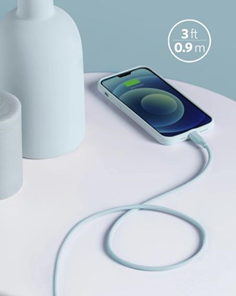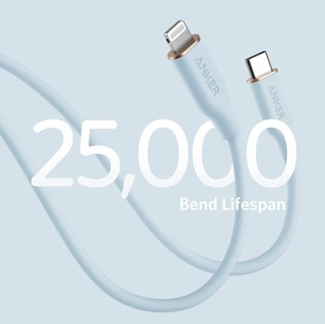Choosing the right Lightning cable for your iPhone goes beyond picking the first one you see. The key factor is MFi certification—Apple’s “Made for iPhone/iPad/iPod” standard. MFi-certified cables meet Apple’s strict requirements for safety, compatibility, and performance. These cables ensure reliable charging and data transfer, minimizing risks like overheating or device damage. Whether you're replacing a worn-out cord or looking for a high-speed lightning charger iphone users can trust, certified options stand out. In contrast, non-certified cables, though often cheaper, can be unreliable or even harmful to your device. By choosing an MFi-certified Lightning cable, you’re investing in long-term device health and user peace of mind. In this guide, we explore the benefits and importance of choosing certified accessories.

What Does MFi-Certified Mean?
Apple’s MFi Program Explained
Apple’s MFi program ensures that third-party hardware accessories meet Apple’s quality standards for its devices. An accessory manufacturer must pass rigorous testing and receive Apple’s approval to earn MFi certification. This certification implies the accessory, like a Lightning cable, will fully support all of Apple’s performance metrics, connecting seamlessly with iPhones, iPads, and iPods.
How to Identify MFi-Certified Cables
Identifying an MFi-certified cable is straightforward, thanks to Apple’s labeling. MFi-certified cables feature the “Made for iPhone” label on their packaging. Additionally, the presence of a unique serial number and an Apple MFi certification badge helps differentiate them from counterfeit ones. It’s crucial to double-check these identifiers when purchasing new cables. Verification can also be done by visiting Apple’s official site, which lists all certified accessories. Understanding how to distinguish true MFi-certified cables ensures you’re investing in quality that protects your device.
Risks of Using Non-MFi Lightning Cables
Charging and Battery Damage
Non-MFi Lightning cables can harm your device’s battery life and overall functionality. These cables often lack the ability to regulate electrical current properly, leading to overcharging, overheating, or damaging your iPhone’s battery over time. Compromising on cable quality to save money can end up costing you through reduced battery performance or frequent replacements.
Device Compatibility Issues
Many non-MFi cables fail to sync properly with Apple devices due to compatibility issues. These cables may not support the necessary data transfer protocols, leading to errors or the inability to transfer data effectively. Users often report frequent notifications like “This accessory may not be supported,” which disrupts usage. Spending a few extra dollars on MFi-certified cables ensures your device connects seamlessly without annoying interruptions.
Safety Hazards and Fire Risk
The most significant risk of using non-MFi certified cables is the potential safety hazard they pose. Inferior materials and poor design can lead to overheating, sparking, or even fires. Stories of devices catching on fire due to these cables are not uncommon. Not only do they risk damaging your device, but they can also lead to personal injury. MFi-certified cables undergo stringent testing to ensure safety, mitigating such risks.
Key Benefits of MFi-Certified Cables
Faster, Safer Charging and Data Transfer
MFi-certified cables provide a stable connection for faster and safer charging. They meet Apple’s optimized specs for efficient electrical current management, preventing overheating and minimizing charge time. The certification also ensures reliable data transfer, allowing you to sync files swiftly and securely without data corruption.
Longer Cable Lifespan and Durability
Durability is another major advantage of MFi-certified cables. These cables are built with premium materials that resist fraying and wear over time. Enhanced strength ensures less frequent replacements compared to non-certified versions. Investing in an MFi-certified cable means you’ll likely make fewer trips to the store to replace worn-out cables.
Warranty Compliance and Apple Support
Using MFi-certified accessories helps you stay in compliance with Apple’s warranty policies. If a device issue arises, using certified products ensures you remain eligible for Apple’s support services. In contrast, using non-certified cables can void your warranty, leaving you on your own to tackle costly repairs.

Recommended MFi-Certified Lightning Cables
Why Choose Anker for iPhone Cables?
Anker, a trusted brand in tech accessories, offers MFi-certified Lightning cables known for their outstanding durability and fast charging. Designed to meet Apple’s strict standards, these cables ensure safe, reliable performance for iPhones and iPads. Anker's commitment to quality and customer support makes their Lightning cables a dependable choice for users seeking longevity and top-tier charging efficiency.
Top Anker Picks: Anker 641 USB-C to Lightning Cable (Flow, Silicone), etc.
The Anker 641 USB-C to Lightning Cable (Flow, Silicone) is a high-quality USB‑C to Lightning cable designed specifically for Apple users, boasting full MFi certification for seamless, safe compatibility with iPhones, iPads, and iPods. It features a tri-layer design—copper core, flexible graphene, and a soft silicone finish—that delivers both durability (with a 25,000‑bend lifespan and 220‑lb tensile strength) and a silky touch. Available in 0.9 m and 1.8 m lengths and eight vibrant colors, it resists tangling and includes a silicone strap for tidy storage. Supporting Power Delivery fast charging (up to 100 W), it charges iPhones quickly when paired with a compatible PD charger.
Conclusion
Opting for MFi-certified Lightning cables ensures you’re investing in safety, quality, and reliability. With these cables, enjoy stress-free charging and data transfers, safe in the knowledge that your device is protected against damage and risks associated with substandard alternates. Although non-certified cables might look appealing due to cost, the potential hazards and reduced performance simply aren’t worth the risk. Prioritize certified products that promise quality and support. Brands like Anker offer excellent, MFi-certified options that align well with your device’s needs. Make a well-informed choice today to enhance your iPhone experience, ensuring safe and efficient device charging and connectivity for years to come.






